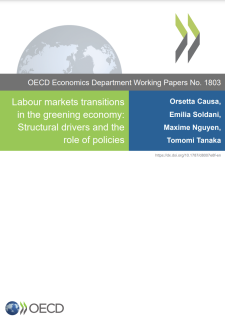
Climate change mitigation policies are reshaping the labour market by contracting jobs in high-polluting industries and expanding opportunities in the green sector. A just transition requires policies that improve worker allocation and minimize the negative impacts of job losses in polluting industries.
This paper uses econometric analysis to investigate how structural and policy factors influence labour market transitions. It examines the varying effects on different worker groups, emphasizing the role of education and the disparities faced by women.
The analysis highlights the importance of general structural policies and place-based interventions to support a smooth transition to a green economy.
